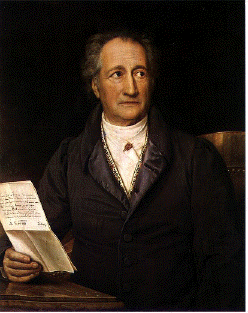|
Johann Wolfgang von GoetheJohann Wolfgang von Goethe (Aug. 28, 1749—Mar. 22, 1832) "The world is for thousands a freak show; the images flicker past and
vanish; the impressions remain flat and unconnected in the soul. Thus
they are easily led by the opinions of others, are content to let their
impressions be shuffled, rearranged, and evaluated differently." He was also the leader of the German Romantic movement which profoundly influenced the growth of sonnets, romanticism, lyrical poetry, and love notes. He allowed women to fully shape his career, and his work thrived on their input. He wrote Moral-sensuous erotic librettos with remarkable elegance, enabling sixteen year olds to fall in love with him at the drop of a bonnet, even while he was in his late seventies. Goethe met, in his lifetime, an enviable collection of naive, middle-class girls who found themselves in that precious phase of "waiting" for that one special male who could trigger their dormant passions. The Quotable Goethe: The true, prescriptive artist strives after artistic truth; the lawless artist, following blind instinct, after an appearance of naturalness. The one leads to the highest peaks of art, the other to its lowest depths. One of the most striking signs of the decay of art is when we see its separate forms jumbled together. One ought, every day at least, to hear a little song, read a good poem, see a fine picture, and, if it were possible, to speak a few reasonable words. Man knows only when he is satisfied and when he suffers, and only
his sufferings and his satisfactions instruct him concerning himself,
teach him what to seek and what to avoid. For the rest, man is a confused
creature; he knows not whence he comes or whither he goes, he knows little
of the world, and above all, he knows little of himself. No two men see the world exactly alike, and different temperaments will apply in different ways a principle that they both acknowledge. The same man will, indeed, often see and judge the same things differently on different occasions: early convictions must give way to more mature ones. Nevertheless, may not the opinions that a man holds and expresses withstand all trials, if he only remains true to himself and others? He who has a task to perform must know how to take sides, or he is quite unworthy of it. |
